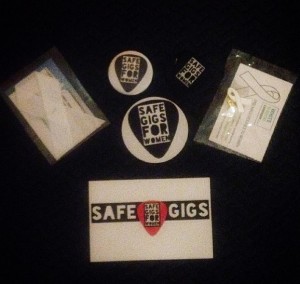Tracey Wise, London, UK, SSH Blog Correspondent
 Since establishing Safe Gigs for Women, one of its core aims has been to get venues and festivals on board. Whilst it is clear venues themselves cannot be fully held accountable for the actions of individuals, there are many actions they can take to ensure a better experience for all their customers, male and female alike, and make it clear that such behaviour is not acceptable in their establishment.
Since establishing Safe Gigs for Women, one of its core aims has been to get venues and festivals on board. Whilst it is clear venues themselves cannot be fully held accountable for the actions of individuals, there are many actions they can take to ensure a better experience for all their customers, male and female alike, and make it clear that such behaviour is not acceptable in their establishment.
Firstly, having been on the receiving end of unwanted attention by a festival security guard, it should go without saying that staff at such events and venues should be the first line in preventing harassment in the first place. They should also be taking reports of harassment seriously and doing everything they reasonably can to assist the complainant. Venues in Boston, USA provide a safe refuge for anyone in trouble at a gig, and this seems like a fairly simple approach. Dedicated members of staff can then engage with anyone with any concerns or needs. This seems a very practical, low cost approach towards safety.
I understand the music industry, live music in particular, cannot exist without the support of alcohol companies. However, isn’t it time this was reframed? Whilst there has been a campaign in the UK to ‘drink responsibly’ and be drink aware, with so much attention surrounding alcohol and its role in sexual assault, is it perhaps not time that am alcohol company came out to state it will be taking proactive action against this? Actually take the initiative and be the first to challenge this head on? And whilst we’re at it… Soft drinks companies, how about lowering the price of your products in venues, in order to contribute towards greater safety and the enjoyment of others? And venues can reinforce this with greater provision of free water, available at any time, to those who need it. Better use of cooling systems in venues would also reduce the instances of people getting drunk and improve safety all round.
Quite early on from establishing safe Gigs for Women, I was approached by a local authority in London, Camden Council, an area well known for its musical history and links to alternative cultures. To enact the above changes we will need support from local authorities, those ultimately responsible for licensing venues. We’ve been lucky to have Camden on our side. But what about venues and authorities not in favour of projects like this?
Then consider this. I am a self-declared music obsessive person. In working with Camden Council, I did some tough sums, and estimated that with the gigs I have attended in Camden alone this year, the cost of tickets, food and drink that I have spent in their local economy is somewhere between £1500 – £1800. When women who have experienced harassment at gigs state that their experiences now stop them going to gigs, venues should consider the effect on them, economically.
Safe Gigs for Women welcomes any venue that wishes to work with us — and thanks Camden Council for its support.
Born and raised in London, Tracey is a graduate of City University. She has spent the best part of her life at gigs and festivals and obsessing about music and created the “Safe Gigs for Women” project.
